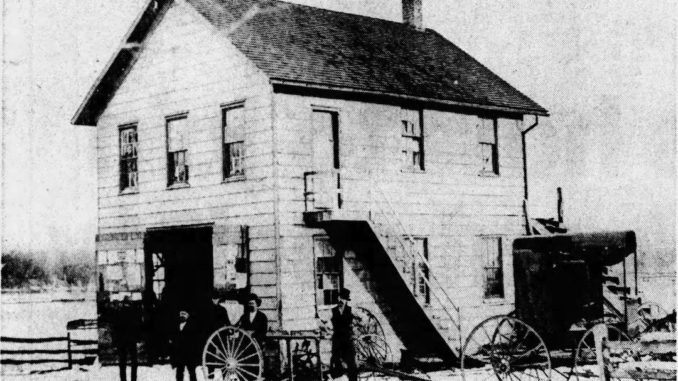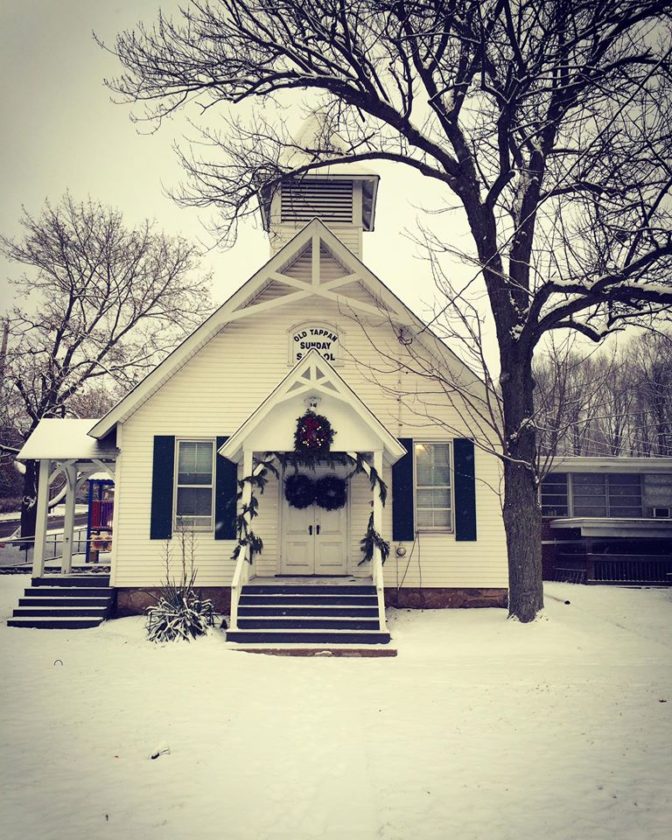
OLD TAPPAN, N.J.—May E. Mence Gifford was born in Old Tappan back in 1881, at a time of dirt roads, horses and wagons, years before the first phone came to town, and before electricity. In her childhood, Old Tappan had fewer than 200 residents. The children attended a two-room wooden schoolhouse on Old Tappan Road near Leonard Drive. People worked hard, didn’t have the comforts of our modern era, but life was more simple.
May’s grandfather, the Dutch-born Henry Mence, ran a blacksmith shop on Old Tappan Road. A third generation blacksmith, young Henry established his smithy back in the 1850s when he moved to the area with his new bride. As the winter season dawned, people would be going to the shop to get studded shoes on their horses (the snow tires of the day). It was also a place to gather with neighbors to trade news and gossip, with the warmth emanating from the forge providing a pleasant respite from the cold.
May’s father, William Mence, took up the family business and worked as a blacksmith even into the 20th century, when cars started to replace horses. William also served as Old Tappan’s tax collector, district clerk, a member of the board of health, and a councilman.

In December 1968, three years before her death at age 89, May penned a beautiful recollection of Christmastime in 1880s Old Tappan. It is reprinted here.
It made a beautiful setting for Christmas holidays, while inside the women were bustling about, baking good things to eat for Christmas.
The little girl of the household was singing all day long. Wasn’t Santa Claus coming that night? He always had, and she was sure he would come again. But first her daddy told her he would take her to see the Christmas tree at the Old Tappan Chapel. She wasn’t sure what that meant, but knew it was something nice to anticipate.
At last the evening arrived and her mother bundled her up like an Eskimo, her father seated her on a hand sled his father had made him a generation before. Her father took the rope in his hands and off they went on the half-mile walk to the chapel. Such a beautiful white world it was, as they wended their way to the chapel. The stars looked down; the winter wind swayed the branches of the old trees back and forth, making weird shadows on the snow.
Soon the brightly lighted chapel bloomed into view. The sled was parked. The little girl and her father opened the door of the chapel and stepped into what looked like a veritable fairyland. It was a bower of beauty. Every window was bedecked with a wreath of evergreens. Garlands of evergreens draped the walls. But the main object of beauty was the huge Christmas tree at the end of the aisle. It was bedecked with strings of popcorn and paper chains and cranberries and little paper dolls, which seemed to be dancing around the tree in glee.
The decorations were the small taper [candles], each one in its own holder fastened to the branches of the tree. Now that we had looked at all the beauty surrounding us it was time to listen to the Christmas story being read and the beautiful carols sung, giving us a better understanding of Christmas.
Then the oil lamps were turned down low. Two young men with lighted tapers on each end of the long poles they carried in their hands proceeded to light the candles on the beautiful Christmas tree. Soon it was a blaze of light pointing upward. Sometimes a branch caught fire. Another young man with a snuffer would put it out. A box of candy and an orange were distributed to each of the children. The candle light diminished; lamps were turned up and brightness reigned again.
After greeting all their friends and neighbors, the little girl was once again seated on her sled for the homeward journey. The stars looked down as before. Once home, she hung up her stocking with care. She made up her mind she was going to listen for Santa and his reindeer on the roof that night. But, do you know? She never did hear him. But, in the morning when she looked in her stocking, she found he had left her candy, nuts, and oranges. How happy she was that he had found her, such a little girl, who lived way in the country.
—May E. Mence Gifford, 1968
